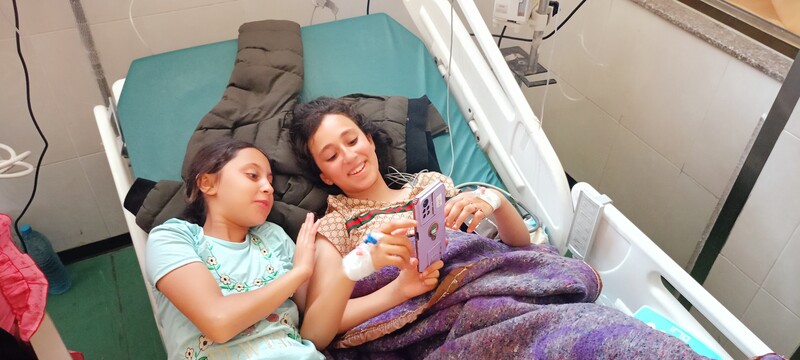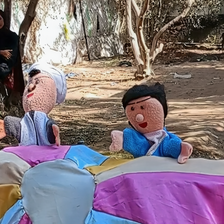The Electronic Intifada 7 June 2024

Saida visiting Tala in hospital. (Photo courtesy of family)
After fleeing Gaza City in the early stages of the current war, I have been displaced several times.
For a number of months, I and my family were in Rafah, Gaza’s southernmost city.
Israel’s recent invasion of Rafah meant we had to leave. We have moved from a tent in Rafah to one in Deir al-Balah, central Gaza.
Life in tents is depressing.
Without any sources of entertainment, we have tried to arrange our own.
My daughter Saida, 12, and my niece Tala, 13, have performed ballet for us.
Neither of these girls have gone to ballet classes. They learned their ballet movements from YouTube videos.
During the evening hours, we would gather in our tent and watch the girls dance to patriotic songs.
They included “Jaffa” by the Lebanese singer Fairuz.
Tala and Saida changed its lyrics a little. “We will return, Jaffa” became “we will return, Gaza.”
The girls gave us great hope that the war would end and that we would go back to Gaza City. We applauded them.
That was before Tala suddenly fell ill. She had severe headaches and could not stand up.
We quickly brought Tala to al-Aqsa Martyrs Hospital in Deir al-Balah. It was very crowded and the staff were overworked.
There was no bed available for Tala.
One of the nurses put Tala on the ground. The nurse told us that they had to prioritize treating people who had been wounded.
More than 30 minutes later, a doctor – looking exhausted – came and began to examine Tala.
“The girl needs urgent medical care,” the doctor said. “And I cannot provide it to you here.”
The hospital simply did not have the capacity to help.
I spoke to Tala’s father – my brother-in-law – about what we should do.
Could Tala be referred to another hospital? I suggested Nasser Medical Complex in the southern city of Khan Younis as a possibility.
My brother-in-law asked if that hospital was functioning. Like so many other healthcare facilities, it had been attacked by Israeli troops.
I told my brother-in-law that Nasser Medical Complex had resumed some services after the Israelis withdrew from it in the last week of February.
There were no ambulances available. So my brother-in-law borrowed a car from a friend.
We set out in it toward Nasser Medical Complex. Tala’s pain became more acute during the journey.
Astonished
A bed could be found for Tala in its emergency department. And a doctor attended to her quickly.
After examining Tala for a few moments, the doctor left the room. “Give me some time and I will come back to you,” he said.
A few minutes later, he returned with a colleague.
The doctors asked Tala a series of questions.
Had she been ill during the war?
Did she have a severe fever previously?
Did she have pain in her lower back?
Was she short of breath?
Tala answered “yes” to all of the questions.
It came as a shock when the doctors informed us that Tala was quadriplegic due to infections in the spinal cord.
“The situation is very serious,” one of the doctors said. “And it cannot be treated in Gaza.”
An MRI scan would have to be undertaken so that the diagnosis could be confirmed, the doctor explained. That was not possible in Gaza.
The hospital used to have an MRI machine but the Israelis had stolen an essential part of it.
During our conversation, the doctor went to wash his hands. But no water came out of the faucet.
“Even water isn’t available,” he said.
The doctor recommended that Tala receive treatment in Egypt or Turkey. But that cannot be organized.
Israel has invaded the area around the Rafah crossing, so travel to and from Egypt has been blocked.
Tala remained in Nasser Medical Complex. She asked that Saida, my daughter, go and visit her.
The two girls wept when they met in the hospital. They both lay on Tala’s bed and watched videos of them dancing.
Saida tried to assure Tala that “you will get back on your feet and we will dance again.”
“Maybe I will,” Tala replied. “Or maybe I won’t be able to.”
Then Tala told Saida that “there is a bright side to this disease.” She described it as “my ticket out of Gaza to escape the Israeli bombing.”
Everyone who heard what Tala said was astonished. Tala felt that this was the only way she could get out of the hellish situation we have faced in Gaza for months.
But we still don’t know when or if she will be able to have the treatment she needs.
Unless the Rafah crossing reopens, her health is likely to deteriorate.
Rasha Abou Jalal is a journalist in Gaza.





